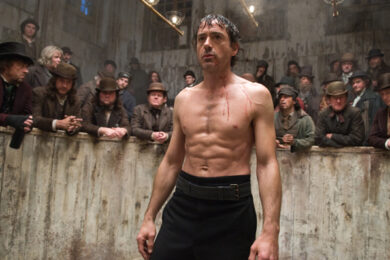Pipe smoking? Check. Intellectual prowess? Check. Astute observations and forensic skills? Check. Bare-knuckle brutality and fast-framed action? Er, perhaps not. Following a reasonably prolonged hiatus, Sherlock Holmes returns to celluloid, and it’s a toss up which is the most surprising: the fact it took Hollywood so long to bring the venerable English gent back to the big screen, or the fact Guy Ritchie was appointed to direct. On a purely superficial level Ritchie would appeal to the big cheeses at Lin Pictures because a) he’s English, and b) his last movie RocknRolla actually avoided losing money for a change.
Producers with even a cursory knowledge of the fictional detective, however, would surely wince at the image of Aurthur Conan Doyle’s much-beloved character bare-chested and cracking heads as Dr Watson spin-kicks and karate chops behind him. Or would they? While a few thousand anal Sherlockians might choke on their opium at the prospect of Holmes going mano-a-mano with hard cockney geezers in illegal, underground cage fights, most Hollywood producers surely neither worry nor care how faithful a rendition their film is to the original intentions of the creator, as long as the till receipts are good, and thus far they appear to justify the decision to employ the son of a baronet, giving him carte blanche to make the cerebral physician as neanderthal as he pleases. The Baker Street ball-buster and his intrepid sidekick may yet be back for future sequels, and it won’t be lost on the makers that success with a celebrated, enigmatic English character is certainly possible, as James Bond seemingly goes from strength to strength.
When first speaking to the press about the upcoming project, Ritchie spoke of a circumspect ambition, being as faithful as possible to the original manuscripts of Conan Doyle, though clearly once behind the camera with the power of the clapperboards at his disposal, the Snatch director couldn’t help smudging all over the thing with his hamfisted fingerprints. He conceded from the off that he’s "not much of a reader", though given that he is dyslexic, this is an unsurprising admission. Ritchie worked from tapes, and said what he imagined was ‘not exactly what I’d seen on screen’. Robert Downey Jr’s interpretation of Holmes bears little relation to the demure and dry character portrayed by the likes of Peter Cushing, while Watson, usually portrayed as a drizzly, rather anemic sidekick – a straight man to Holmes’ straightest of men – is intentionally re-imagined in order to smoulder for the cameras (apparently Jude Law’s nickname on set was ‘Hotson’). One of the more surprising elements of this blockbuster is the overt sexual chemistry between Downey Jr and Law, which adds a little frisson to a movie that is definitely overlong, coming in as it does at over two hours. It’s perhaps a rare example of ex-wife Madonna’s good influence paying off.
Watching Sherlock Holmes, you do wonder what else goes through Guy Ritchie’s head though. When Guy sits down to watch Diagnosis: Murder some afternoon, does Dick Van Dyke speak in the preposterous cockney accent he invented for Mary Poppins while to the rest of us he sounds American? Does Guy Ritchie see people from four different angles when engaging with them, sped up, slowed down, panned from the side and circled like a bird of prey? And given his risible penchant for slapstick, does he see people falling over in the street willy-nilly, then getting up and dusting themselves down a la Charlie Chaplin? And speaking of Chaplin, the movie, as one might expect, is certainly saved from the jaws of disaster thanks to yet another impeccable performance from Downey Jr, who played the seminal comedian to many plaudits in the early ’90s. He retains elements of that character for this, most obviously his Anglo brogue, but he brings far more to the table than just a well-honed impression of an English gent, with Downey’s dalliances and past addictions no doubt coming in handy given Holmes’ proclivity for pharmaceuticals.
What could have been a truly awful movie, is salvaged thanks to the actor’s undoubted abilities. It’s not that Sherlock Holmes is bad per se, it’s just that so much is incongruous, and the editing so maddening. Two hours of constant splicing makes for a nauseous ride, and you end up with the overwhelming feeling Ritchie is a one trick pony and that trick now seems more naff than anything conjured up by Sigfried and Roy prior to one of them being mauled by his own tiger.
Having said all that, it’s a curious thing that movie goers expect big screen renditions to be faithful to an original idea, as in other art-forms, notably music, new versions are frowned upon should they too closely resemble the original. There are many examples of authors getting angry when being tampered with by crass and blundering Hollywood studios, such as when Anne Rice famously threw her voodoo dolls out of the pram when she learned Tom Cruise would be playing Lestat in Interview With a Vampire. While the creator may have invested huge amounts of themselves, there can be no embargo on interpretation and imagination; if you don’t like it don’t watch it. I’m certain it can be just as painful for the fan as the author: As a fan of 2000AD when growing up, I should have known Sylvester Stallone would make a wretched Judge Dredd, and there an important lesson was learned. Aurthur Conan Doyle is of course long dead, though according to Simon Callow writing in The Times, Conan Doyle resented Holmes for being so popular, detracting from his other works that he saw as more noble and worthy, so much so that he actually killed Holmes off before having to revive him again whenever he needed the money. A few weird punch-up sequences in a Guy Ritchie movie are unlikely to tarnish or diminish a character who clearly refuses to die.



